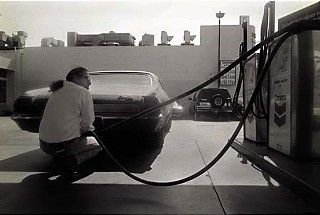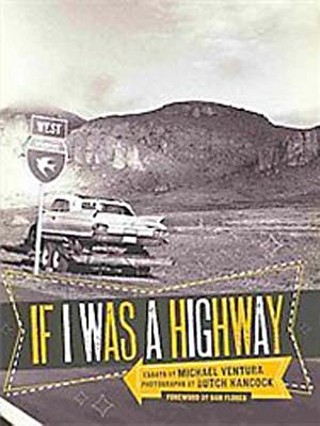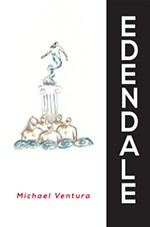The Road Is Long
Michael Ventura's many winding turns
By Marjorie Baumgarten, Fri., April 22, 2011

A couple of weeks ago I contacted Michael Ventura about conducting this interview, but informed him that I had to get another interview out of the way first. Before him in the interview queue stood Angie Dickinson, someone with whom I was very excited to speak but such a towering figure that I needed to carve out some extra time for prep work. In a flash, I received this return email from Ventura: "Angie Dickinson! Of Kulm, North Dakota, no less (though she went to high school in Burbank) ... hard to believe she's 80 (but then, it's hard to believe that I'm 65) ... I envy you your Angie interview." Off the top of his head he knew this, so I quickly prodded him for more tidbits and thoughts. He shared generously and profusely, and was not a bit put off by having to take a back seat to Miss Dickinson.
This collaborative inclination is not the first trait that comes to mind when you think of a writer who has made his bones as an essayist with a singular voice that cuts through the conversational clutter. Sure, there are the novels, the film criticism, the nonfiction books, screenplays, and poems – all of them essential to the Ventura gestalt. He also directed the documentary "I'm Almost Not Crazy ...": John Cassavetes: The Man and His Work and published a memoir about the director, and his relationship to this lion of the American independent cinema is no small coincidence. Ventura has written his biweekly column, "Letters at 3AM," for The Austin Chronicle for the last 16 years (full disclosure: I've served as his editor the entire time). The column had its origins in the LA Weekly, a publication he co-founded in 1978 and wrote for until 1993. There he wrote features and film criticism before launching his column. His first published article appeared in the alternative weekly The Austin Sun in 1974, and he proudly states that he's been "'a working writer' ever since."
If I Was a Highway is a new collection of essays by Ventura, and all but three were originally published in The Austin Chronicle. Released by Texas Tech University Press, the book is punctuated with photographs by one of Ventura's oldest running buddies, singer-songwriter Butch Hancock (including the one pictured here, of Ventura gassing up). The title comes from one of Hancock's lyrics in one of his very best songs, "If You Were a Bluebird." The title clears up a longtime mystery for me. One of the only points of contention between Ventura and myself during the editing of his columns is his dislike of the subjunctive mood. "It just sounds funny to my ears, Marge," he'll say when I suggest changing the word "was" to "were." Now I know why and can blame Butch Hancock, whose wordplay got into Ventura's head decades before I ever arrived in his world.
Ventura's essays for the Chronicle reveal so much about the man, as well as the people and events that have shaped his journey through the world. There seems to be little about himself that Ventura has left unexplored. And he's done it in such an involving, colloquial manner – one that he describes as "personal ... without necessarily being intimate" – that readers feel as though he is speaking to each one individually. It leaves an interviewer wondering what remains to be asked. But here goes.
Austin Chronicle: What is your daily schedule like?
Michael Ventura: I get up whenever I get up, which is, give or take, an hour around noon. The afternoon goes slowly, and I kind of build toward what I'm going to do in the early evening. On a day when I don't have to run errands, I work on one project. Not every day, but almost every day. In the late evening, in the beginning, say around 11 o'clock, I write. Tonight it's the column, otherwise it's my novel that I've been writing for three years – and could take another five – and I work until 2 or 3 or 4 in the morning, have a couple drinks, and go to bed. That's not counting studying, because I skipped over that part. That's my day, and it's almost every day. And I exercise in there. That's real important, actually. Now I dance about 40 minutes a day.
AC: I'm trying to picture you in a Jazzercise class.
MV: No, no, no, no, no. I just put on music I like and dance. And that clears me up. And without getting pretentious about my "process," as they say in Southern California, the tuning up to the place where I'm gonna work is really important. The only really big rule I have is that if I've intended to work, I work, no matter what. And even if I can't work, even if I know I'm not going to get anything done, I sit with it. I call it "visiting it." And if that means smoking cigarettes and walking up and down for two hours and getting just a paragraph, that's okay because I know what happens. Overnight, and then into the next day, the thing jells and I get a draft the next night that I can polish the next night. I know myself doing this enough to know that even if I'm lousy one night and getting hardly anything, putting in the effort is going to get me over the hump the next night. Because, you know, the column's like a goddamn sonnet. It – goes – in – this – space. It's got to fit into this space, and that's it.

AC: Do you ever run out of topics?
MV: I haven't yet. Sometimes I get afraid I'm going to. Sometimes I almost call you up and say, "Marge, have I written this before?" Because sometimes I get a kind of déjà vu. Like with this week's column, I know I've referred to Route 66 before, but I know I haven't written about meeting Stirling Silliphant.
AC: Your columns are like musical refrains in which stanzas or choruses return.
MV: Which is one reason that, from the beginning, I thought of the column as letters. Back in the day, before we had all these gadgets and before I was a published writer, I wrote lots of letters. I didn't realize that I was rehearsing, but that's really what it was. The form is personal in that sense, without necessarily being intimate.
AC: You work in so many different formats. Does each provide something the other doesn't?
MV: The essay is like a conversation in a booth at a diner, or as I said, a letter. The novel is a whole different medium. People have said, "I like your essays; I hate your novels." And I said: "Because in my essays I'm talking to you and in the novel you're in my head. And that can be an unlikable place to be." Poetry was my first mode. It was my first love, and I spent many, many years off and on writing a very long poem about the 20th century that some day I'll put all up on the Web. With some kinds of nonfiction, like the book on John Cassavetes, that was a witnessing.
AC: Why have you settled in Lubbock of all places?
MV: One of the three pieces [in If I Was a Highway] that isn't a Chronicle piece is a long piece I wrote for the Psychotherapy Networker about hitting my late 50s, going broke in L.A., and going: "Okay, what do I do now? I can't live here anymore. Austin's almost as expensive. and the traffic's almost as bad, if not worse. I have friends in Lubbock. I know Lubbock. The cost of living is way less than in most places." And so I didn't think twice. I went to Lubbock. ... Plus, I wanted to get some books written. This is a damn good place to do it.
AC: Especially if you connect up with Texas Tech University Press.
MV: Which is an opportunity that fell out of the sky. Andy Wilkinson, [the book's editor, took me and Butch] out to dinner and asked how we had met. I told him the story. He said, "Have you ever written this down?" Butch laughed and said, "Yeah, about a hundred times." So I just put together a bunch of essays and he took them over to Texas Tech Press and that was that. It's been the easiest book I ever published.
Michael Ventura will read from If I Was a Highway and sign copies at 7pm on Friday, April 22, at BookPeople, 603 N. Lamar.










